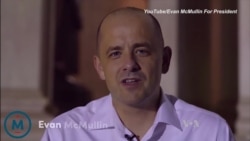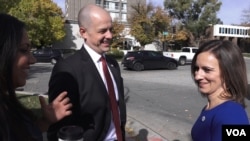Sometime after polls close on November 8, Americans will find out the next president of the United States. But one of the most intriguing questions of the 2016 election won't be resolved: what happens to the Republican Party in the age of Donald Trump?
One person watching closely is independent presidential candidate Evan McMullin. One of Trump's fiercest conservative critics, McMullin isn't optimistic about where the Republican Party is headed under the leadership of its presidential nominee.
"I think Donald Trump is doing potentially existential damage to the Republican Party," McMullin told VOA during an interview at his campaign headquarters in Salt Lake City, Utah.
McMullin, who only entered the race in August, is threatening to pull off an upset victory in Utah, his home state. If that happens, it could be devastating to Trump's presidential chances, since the race between Trump and Democratic presidential candidate Hillary Clinton appears to be narrowing and may be decided by a small number of electoral votes.
McMullin's own chances of winning the presidency are slim. He's only on the ballot in 11 states. Even if he won all of those states, he'd still fall far short of the 270 electoral votes needed to win the presidency.
The only way McMullin could possibly win is if neither Trump nor Clinton reached the needed threshold, sending the race to Congress to decide.
After the election
Instead, McMullin is looking past the election, beyond his own candidacy and toward what he calls a "new conservative movement" that would run parallel to the Republican Party.
It's not certain that he can pull off such an ambitious proposal. And his own role in that movement is unclear. But nonetheless, he says it's important to provide a conservative alternative to Trump.
"He has given the white supremacist movement a voice. He has opened the door for increased sexism and religious bigotry," McMullin said. "And that makes it very difficult for a party in a country as diverse as ours to offer leadership to the American people."
McMullin is careful to emphasize that not all Trump supporters are white supremacists. But still, it's an issue he spends a lot of time talking about. During his 15-minute interview with VOA, he brought up white nationalists or white supremacists six times.
The single, 40-year-old McMullin entered the national political scene only three months ago. Before that, he served 10 years as a CIA operative, including a stint as an undercover spy during the Iraq War. He's been a Mormon missionary to Brazil, an investment banker at Goldman Sachs, and a director of the House Republican Conference, focusing on domestic and foreign policy.
McMullin calls himself a constitutional conservative, favoring limited government, and in that way is not unique for a Republican. But on social issues, he's relatively progressive, at least compared to some of his conservative peers in Washington. (For instance, he said he's personally against same-sex marriage, but considers the issue to have been settled by the Supreme Court.)
On foreign policy, McMullin goes against the recent trend of isolationism within the Trump-led GOP. He is highly critical of President Barack Obama's foreign policy, saying it is too weak and has resulted in the U.S. withdrawing its leadership in the world. He also supports free trade, going against the recent wave of protectionism that has sprung up in both parties during the current election.
In many aspects, McMullin dreams of a moderate conservative political party that doesn't actually exist right now. And he's using this election as a platform to see if he can make it happen.
New party?
McMullin isn't dead set on starting a new political party. But in his view, if Republicans continue to follow Trump, there won't be a choice.
"If the Republican Party isn't able to change, and isn't able to reverse course and essentially do a 180-degree turn and go in the opposite direction, then I believe that it will shrink in size and influence and ultimately become a populist white nationalist party," he said.
Historically, new political parties have largely failed to become competitive in the modern U.S. political arena. But McMullin points to exceptions, including the Republican Party itself, which rose to power on an anti-slavery platform in 1854, to the demise of a fractured Whig Party.
But more recently, such efforts have failed.
Political scientists point to a number of reasons. One factor is structural restraints, such as the first-past-the-post election system, which ensures that the parties of losing candidates do not receive any representation.
"In American politics, the system is stacked against new parties," said Quin Monson, political scientist at Brigham Young University. To counter those challenges, any successful new party must identify and exploit a single polarizing issue that divides a large portion of the U.S. electorate, he says.
Does McMullin have a single issue that is divisive enough to drive a significant wedge between traditional conservatives and those in the Trump camp? And could that issue be Trump's nativist appeals? Some political scientists say that's at least conceivable.
"Trump and his supporters take much more explicitly nativist stances, basically saying we need to stop immigration and protect not only how America is now, but move it back to what it once was, and limit foreign influence," said Seth Masket, political science professor at the University of Denver, who believes the Republican Party is currently divided among two camps.
"You have another good chunk of the Republican Party who for years now has been saying that's not how we win elections, that this country, whether we like it or not is becoming steadily more diverse and we have to learn now how to reach out to these people's concerns," Masket said.
Looking ahead
There is no shortage of prominent anti-Trump figures who would be well-placed to take up the conservative mantle, including 2012 Republican presidential candidate Mitt Romney, Ohio Governor John Kasich, or Arizona Senator John McCain.
Where does McMullin fit among those figures, and is he considering a 2020 run for president, if Trump loses?
Asked those questions, McMullin deflected, saying he's content for now to be a conservative alternative to Trump, hoping that can serve as a launching pad for a message that will carry forward beyond election day.
"We concentrate more on building a new conservative movement," he said. "I'm not sure what my role will be in that."

































